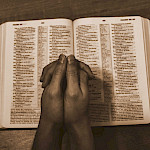First aid
“Behold an angel touched him, and said unto him, ‘Arise and eat.’”(1 Kings 19:5)
Here is a prophet in the bonds of melancholy. The light of his hope has been blown out. His soul has been convulsed, and his faith is shaken and lies like an overturned pillow upon the ground. Life has lost its strong serviceableness and its attractive savour. Nothing remains that is worth while. The brief volume of his active, busy days is ending in futility and disaster. "And he came and sat down under a juniper tree, and requested for himself that he might die.” “And behold, an angel!” And what will the angel do for this fainting, drooping servant of God? What will the angel say? What first aid will he give to this broken spirit? Does he rend the temporal veil and rejuvenate the wayworn prophet by some vivid glimpse of the fighting hosts of God?
Does he make some startling declaration of the reality of the Creator’s immediate presence and power? The angel’s ministry is of a much more simple character. “He touched him and said, ‘Arise and eat.’” Is that all? Yes, that is all. That is the beginning and the end of the angel’s mission.
Now, that is very significant. An angel comes to a godly man who is depressed in spirit, and he tells him to give immediate attention to the needs of his body! The beginnings of restoration are to be found in an ordinary meal. Some of his spiritual faintness is due to his physical faintness, and if he remove the one he will help to dispel the other. He has allowed himself to get "run down,” and his bodily exhaustion has partially induced the exhaustion of his soul.
That is a peril against which we need to be on our guard. Our spiritual maladies are strengthened by our bodily neglects. There are some forms of fearfulness which are directly attributable to our bodies being “out of sorts.” Weakness engenders doubt. Anaemia produces sluggish wills. Bad blood creates irritableness and all the miserable retinue that follows in its train. Ill-fed nerves foster nervousness and the ten thousand fears which portray a discordant and chaotic world.
Many a man has the nightmare that his public usefulness has ended, and the cause of the nightmare is a body which is clamouring for a little more care. Even Mr. Spurgeon wrote out his resignation more than once, under the depressing conviction that his ministry was over; but it was only a rebellious body which was colouring everything blue. One night’s sleep, and in the morning his purposed resignation was committed to the flames! Yes, a little more care for the body and many burdensome needs would never arise.
And in these times of sorrow through which we are living let us not make our griefs tyrannical by giving them the allies of exhausted bodies.
Previous article Next article




